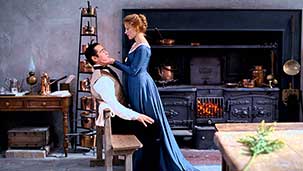As prop hand, you’re surely familiar with the world’s most famous prop-based theory of drama: Chekhov’s Gun. The renowned playwright described the principle like this: “If you say in the first chapter that there is a rifle hanging on the wall, in the second or third chapter it absolutely must go off.”
Miss Julie, written by Chekhov contemporary August Strindberg and adapted for the screen by Liv Ullmann, is a prime example of naturalism. It’s realistic, it’s a careful study of human behaviour, and, above all, it’s austere. Every prop is there for a reason. While you may not have had to provide a rifle to any of the actors in Miss Julie, they will be wounded nonetheless.
What starts out as an exhilarating pas de deux of two desperate people bringing each other to the height of ecstasy and the depths of despair, things eventually grow tiresome. If you had hoped for a light summer job to supplement your regular gig of doing prop work on Game of Thrones, I’m sure you were soon wishing you had signed on for that Carrot Top movie instead.
Miss Julie takes place at a Baron’s estate during Midsummer Night in 1890. The Baron’s valet, John, is engaged to the pious cook Kathleen, but must fend off the amorous attempts of the Baron’s daughter, Miss Julie. Throughout the course of the night, John and Miss Julie will enter into a dangerous affair that will have fatal consequences.
Ullmann is no stranger to cinematic tragedy. As one of famed director Ingmar Bergman’s muses, Ullmann starred in many of the legendary Swede’s films – Cries and Whispers, Persona, and Scenes From A Marriage, to name a few – all of which examine themes of class, faith, and redemption. As a director (Faithless, Sofie) Ullman has often explored complex relationships between men and women. Strindberg’s study of a strong-willed aristocratic woman and an ambitious servant dancing between repulsion and desire would seem the perfect vehicle for Ullmann. And it is—almost to a fault.
With a few noticeable exceptions, Miss Julie is filmed mainly in the kitchen of the estate, which must have made your job easier. Unfortunately the static nature of the sets and the cinematography make it difficult for the film to overcome its stage origins, and threatens to undermine the naturalistic conceit. Thankfully, three very skilled actors are able to transcend these boundaries and deliver performances that are alternately heartbreaking, explosive, and agonizing. Jessica Chastain and Colin Farrell, as Miss Julie and John, take turns seducing and rebuffing one another, all to the point of physical and emotional exhaustion. But it’s Samantha Morton as Kathleen who steals the movie with her understated despair. As the moral center of the story, Kathleen might be a woman scorned, but she’s never pitiable.
Much like your dedication to filling Tyrion Lannister’s wineskin, most of your job here involves drinking vessels. In an early scene in which Kathleen serves John lunch, he asks for his wine in a crystal glass. Later, when Miss Julie orders John to serve her a beer, he pours it into an earthenware mug. These class distinctions are constantly at play. After their affair is consummated and Miss Julie realizes she is a ruined woman, John shuns her by saying that intimacy between the working class doesn’t mean anything, but for the aristocracy, it means everything.
Every scheme to save reputations is marked by one of the characters pulling out glasses from the cupboard and something dark and alcoholic from a dusty bottle. Here is where your skills must have been seriously tested. You no doubt had many a conversation with the script supervisor before each take to determine exactly how much alcohol needed to be in each goblet. While watching Chastain and Farrell treating each other so brutally day after day, were you ever tempted to switch their fake wine with the real stuff? Did you secretly long for a stiff drink yourself? I know after more than two hours of watching their bleak struggle I was begging for some relief.
By the third act, a pouch of money and a straight razor contribute to a tension already heightened by lust, loathing, and, of course, alcohol. It’s only a matter of time before these props bring the entire depressing scenario to an unsurprisingly grim conclusion. Ullmann tries to soften the rough edges by making the film look like a glowing 19th-century oil painting, and should be commended for her ability to draw out such tortured and raw performances. But as the film plods its way to its foregone and ugly conclusion, it seems she just didn’t know when to put it out of its misery. It’s a shame you couldn’t have handed her Chekhov’s gun. Or Tyrion’s wineskin.
Regards,
Di







